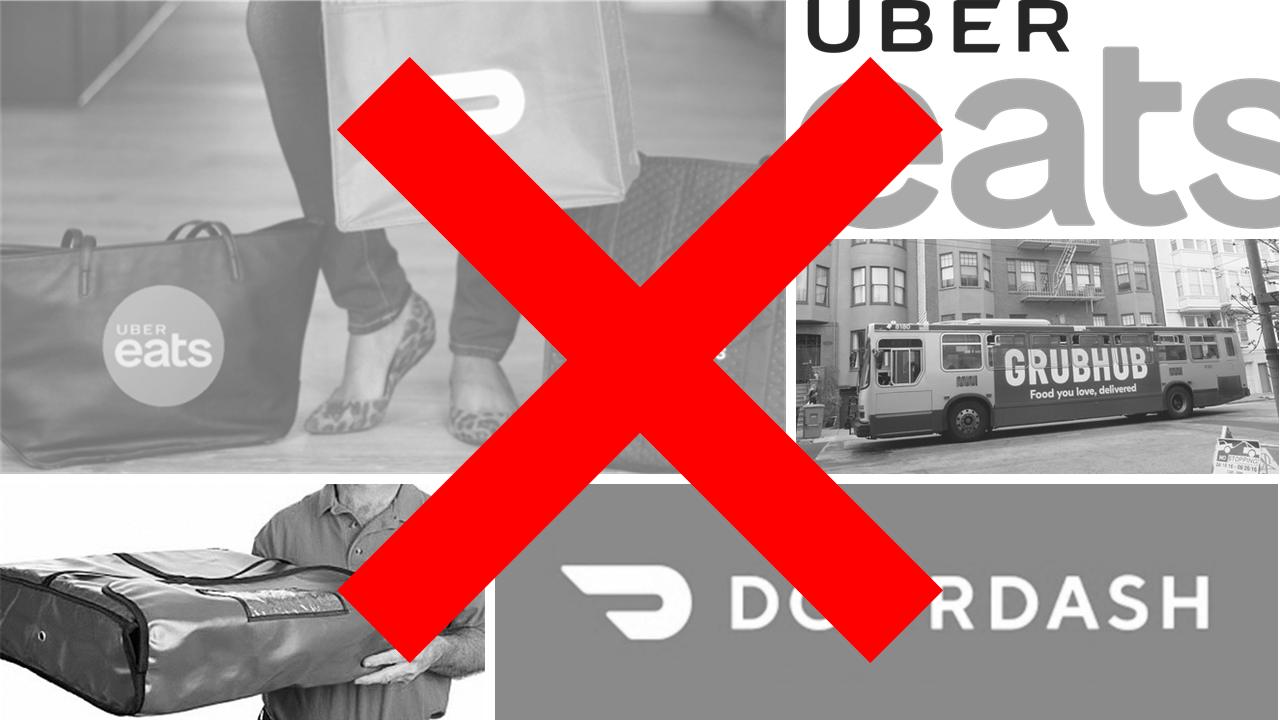 Local restaurateurs have been pummeled by empty dining rooms, reduced volume and a reliance on takeout and delivery during the pandemic.
Local restaurateurs have been pummeled by empty dining rooms, reduced volume and a reliance on takeout and delivery during the pandemic.
Now, some are pushing back against the third-party national delivery apps that they say are thinning their profits even further by taking more off the top of the industry’s already-thin margins.
A handful of local restaurant owners have begun openly encouraging customers to order directly from their establishments, in lieu of using apps such as DoorDash, GrubHub, UberEats and Postmates, most of which arrived in Richmond between 2017 and 2018.
Patrick Stamper and Randy O’Dell, owners of En Su Boca taco shop and Beauvine Burger Concept in the city, were among the first to publicly push back against the national brands.
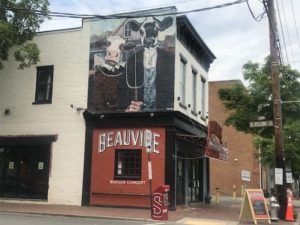
Beauvine in the Fan was among the first to publicly push back against national delivery apps. (Mike Platania)
Beauvine recently began affixing flyers to takeout orders that have a chart listing the increased cost for the customer and thinner profit for the restaurant when ordering through a third-party app. The flyers list an example: A burger and fries order from Beauvine costs $13 if ordered directly, with the restaurant keeping all proceeds. Order through a third-party app, the cost goes up to $19, with the restaurant keeping only $10.
“We’re not trying to start a revolution or anything,” Stamper said. “Consumers are just now becoming aware of how much they’re getting charged.”
Multiple restaurateurs said most national companies’ commission rates are about 30 percent of the cost of each customer’s order.
GrubHub’s total fees for restaurants are around 25 percent. A GrubHub spokeswoman said the company charges a 10 percent delivery fee on customers’ orders, plus an additional 15 percent for a required marketing fee.
DoorDash spokespeople declined to disclose its commission rates. UberEats could not be reached for comment. DoorDash’s website shows a 12 percent service fee and a delivery fee that ranges from about $2 to $6. UberEats’ website shows a 15 percent service fee and delivery fees similar to DoorDash.
Stamper said the profit margin of each order varies based on things such as volume and labor costs. However, he said the 30 percent slice that apps take is likely big enough to put each order in the red.
“It’s safe to assume that basically no food-centric restaurant is operating with a 35 percent overall profit margin,” Stamper said.
Going it alone
Meanwhile, as the city and world went into lockdown, Beauvine and other local restaurants hunkered down and began thinking of their own in-house alternatives to the national apps.
A few weeks into the quarantine, Herbie Abernathy, co-owner of Cobra Cabana in Carver and the forthcoming Hot For Pizza, sat down one day and built a delivery website for his restaurant, and had his staff test it. After fixing a few bugs, Abernathy rolled out the site and rehired as drivers some of the bartenders he’d had to lay off.
“Now I’m able to help the community and I’m not getting ripped off by some third-party, vampiric system that started up,” Abernathy said, adding that Cobra Cabana had been listed on GrubHub for a time but terminated the contract last year.
“I think what you’ll see going forward is people will figure out, just to keep the lights on, you can sell enough food during any kind of disaster. But if you’re giving 30 percent away off the top, you might keep the lights on but you’re not making any money … When you only have a limited amount coming in, 30 percent is a lot to give away.”
Stamper and Odell, who have been in the restaurant business for more than 25 years, immediately dove into delivering and doing takeout themselves, “the old-fashioned way,” as Stamper put it.
“First thing, we added some phone lines, figured out which employees still wanted to work, got a copy of their driver’s licenses and upped our insurance,” Stamper said. “We just completely restructured our whole business.”
At En Su Boca and Beauvine, Stamper said direct orders are now outnumbering GrubHub orders by about three or four to one. The duo is working on a second En Su Boca concept in the Fan, and Stamper said they’re trying to get that started as takeout and delivery only as soon as possible. “Frankly we could use the extra kitchen space,” Stamper said.
Evan Byrne, owner of The Hop Craft Pizza & Beer in the Fan, always has had his own delivery service for the restaurant, in addition to using the national apps. He said the upside of using the third-party sites is added marketing exposure, but the fees do sting.
“Being a small business without a marketing budget, I think there are a lot of people that know about us because of those apps. I don’t want to call them completely useless,” Byrne said, adding that the apps do employ a lot of local drivers.
“We really, honestly, don’t like working with them, but I feel like it’s a necessary evil.”
The Hop is still listed on UberEats and GrubHub, and Byrne said there are benefits to being there.
“On a slow night, sometimes we count on those orders,” he said. “If we weren’t getting some exposure from it, we wouldn’t be doing it.”
The Hop uses its own band of drivers in part to deliver beer and wine in addition to food, Byrne said, something third-party drivers can’t do.
Byrne also has buried some deals on The Hop’s website that he then teases on social media as a way to encourage folks to order directly.
“We have specials and items that you would not be able to take advantage of by ordering through UberEats or GrubHub,” Byrne said. “It’s like we have a secret menu that has a few items on it that’s on our website That’s the only way you can access it.”
Chop Chop seizes the moment
A beneficiary of at least some of the pushback against the national players, as well as the general increase in delivery due to the pandemic, is Chris Chandler, owner of locally based delivery company Chop Chop.
After launching as one of few local competitors in 2018, Chandler said his company was on the ropes prior to the pandemic, but has since had a drastic uptick in new business. Since mid-March, Chop Chop has added over a dozen new restaurants as clients and is doing 500 percent of its former sales volume.
“Full disclosure, we were on the verge of going out of business before this pandemic happened,” Chandler said. “We went from doing $50,000 in food sales for restaurants in February, to now doing $250,000 in food sales per month. It’s been a huge, huge increase … The public and the restaurants helped us get out of the grave.”
Chandler said Chop Chop’s commissions are about half of what the national firms charge, at about 20 percent of the order’s subtotal and not charging for credit card processing fees, which are typically over 3 percent.
“We charge 20 percent commissions all in. We don’t charge for credit card processing on top of that, so that’s where you’ll really see the difference,” he said. “When you break down the numbers, we’re more at like 13 percent commission because we’re taking the hit for those credit card processing fees.”
Chandler theorizes restaurants hadn’t been looking closely at the return on investment the apps offered prior to the pandemic.
“I think (restaurants) were being blinded by all of this. They were bringing all these orders … but they weren’t looking at the numbers and the books and saying, ‘Am I making money off this or not?’” Chandler said.
Stamper’s experience supports Chandler’s theory.
“I’ve always hated their guts,” Stamper said of the national apps. “But it just wasn’t as big of an issue (before the pandemic).”
A Richmond restaurant delivery co-op?
Meanwhile, a businessman by way of Iowa earlier this year tried to organize Richmond restaurants to push out the national apps just before stay-at-home orders were issued.
Jon Sewell, a healthcare vet who now owns a pair of restaurants in Iowa City, in early March visited Richmond to gauge interest from local restaurateurs in creating a co-op style delivery service. Sewell already had set up such a service in Iowa City and in a few college towns in Colorado.
“It’s basically a third-party delivery model … The restaurants come together and make their own delivery service. I like to use the public utility analogy. It’s designed to run at a break-even,” Sewell said.
The startup cost for Sewell’s model is about $40,000 per market, and restaurants in Iowa had each paid about $800 per share to buy in.
A handful of local operators gathered at River City Roll in March to hear Sewell’s pitch of the concept, and among those in attendance were O’Dell of Beauvine and En Su Boca, David Hahn of Salt & Forge and representatives of Sabai. There was interest, but not enough to get it off the ground.
“I’m not opposed to it … I just kind of felt like he was trying to do his own third-party delivery,” Byrne said.
Chandler said he’d talked to Sewell about it as well but wasn’t interested in merging Chop Chop with the new, unnamed service in exchange for equity.
“While it’s a good idea and a great way to get the bigger guys out, you’ve got to have the customer base to do that. He didn’t have that,” Chandler said.
Sewell said he’s putting his plan in Richmond on hold and is working on other markets now.
“It could be Richmond’s maybe a little too big for the model,” Sewell said. “Once Virginia loosens up, I might come back and see if there’s something to salvage.”
For now, until dining rooms are allowed to be filled again, restaurants will continue to lean on delivery and takeout to pay the bills. Byrne put it simply: “I just think the key takeaway is you’re going to save yourself money and save a local business money by ordering or calling us (directly),” Byrne said.
Chandler said Chop Chop is not the only local option that could help restaurants push back, mentioning bike courier Quickness RVA and the recently launched app, Drive-Thru.
“It’s always going to be better to work local,” he said. “It’s always going to be cheaper when you have a smaller organization doing it.”
 Local restaurateurs have been pummeled by empty dining rooms, reduced volume and a reliance on takeout and delivery during the pandemic.
Local restaurateurs have been pummeled by empty dining rooms, reduced volume and a reliance on takeout and delivery during the pandemic.
Now, some are pushing back against the third-party national delivery apps that they say are thinning their profits even further by taking more off the top of the industry’s already-thin margins.
A handful of local restaurant owners have begun openly encouraging customers to order directly from their establishments, in lieu of using apps such as DoorDash, GrubHub, UberEats and Postmates, most of which arrived in Richmond between 2017 and 2018.
Patrick Stamper and Randy O’Dell, owners of En Su Boca taco shop and Beauvine Burger Concept in the city, were among the first to publicly push back against the national brands.

Beauvine in the Fan was among the first to publicly push back against national delivery apps. (Mike Platania)
Beauvine recently began affixing flyers to takeout orders that have a chart listing the increased cost for the customer and thinner profit for the restaurant when ordering through a third-party app. The flyers list an example: A burger and fries order from Beauvine costs $13 if ordered directly, with the restaurant keeping all proceeds. Order through a third-party app, the cost goes up to $19, with the restaurant keeping only $10.
“We’re not trying to start a revolution or anything,” Stamper said. “Consumers are just now becoming aware of how much they’re getting charged.”
Multiple restaurateurs said most national companies’ commission rates are about 30 percent of the cost of each customer’s order.
GrubHub’s total fees for restaurants are around 25 percent. A GrubHub spokeswoman said the company charges a 10 percent delivery fee on customers’ orders, plus an additional 15 percent for a required marketing fee.
DoorDash spokespeople declined to disclose its commission rates. UberEats could not be reached for comment. DoorDash’s website shows a 12 percent service fee and a delivery fee that ranges from about $2 to $6. UberEats’ website shows a 15 percent service fee and delivery fees similar to DoorDash.
Stamper said the profit margin of each order varies based on things such as volume and labor costs. However, he said the 30 percent slice that apps take is likely big enough to put each order in the red.
“It’s safe to assume that basically no food-centric restaurant is operating with a 35 percent overall profit margin,” Stamper said.
Going it alone
Meanwhile, as the city and world went into lockdown, Beauvine and other local restaurants hunkered down and began thinking of their own in-house alternatives to the national apps.
A few weeks into the quarantine, Herbie Abernathy, co-owner of Cobra Cabana in Carver and the forthcoming Hot For Pizza, sat down one day and built a delivery website for his restaurant, and had his staff test it. After fixing a few bugs, Abernathy rolled out the site and rehired as drivers some of the bartenders he’d had to lay off.
“Now I’m able to help the community and I’m not getting ripped off by some third-party, vampiric system that started up,” Abernathy said, adding that Cobra Cabana had been listed on GrubHub for a time but terminated the contract last year.
“I think what you’ll see going forward is people will figure out, just to keep the lights on, you can sell enough food during any kind of disaster. But if you’re giving 30 percent away off the top, you might keep the lights on but you’re not making any money … When you only have a limited amount coming in, 30 percent is a lot to give away.”
Stamper and Odell, who have been in the restaurant business for more than 25 years, immediately dove into delivering and doing takeout themselves, “the old-fashioned way,” as Stamper put it.
“First thing, we added some phone lines, figured out which employees still wanted to work, got a copy of their driver’s licenses and upped our insurance,” Stamper said. “We just completely restructured our whole business.”
At En Su Boca and Beauvine, Stamper said direct orders are now outnumbering GrubHub orders by about three or four to one. The duo is working on a second En Su Boca concept in the Fan, and Stamper said they’re trying to get that started as takeout and delivery only as soon as possible. “Frankly we could use the extra kitchen space,” Stamper said.
Evan Byrne, owner of The Hop Craft Pizza & Beer in the Fan, always has had his own delivery service for the restaurant, in addition to using the national apps. He said the upside of using the third-party sites is added marketing exposure, but the fees do sting.
“Being a small business without a marketing budget, I think there are a lot of people that know about us because of those apps. I don’t want to call them completely useless,” Byrne said, adding that the apps do employ a lot of local drivers.
“We really, honestly, don’t like working with them, but I feel like it’s a necessary evil.”
The Hop is still listed on UberEats and GrubHub, and Byrne said there are benefits to being there.
“On a slow night, sometimes we count on those orders,” he said. “If we weren’t getting some exposure from it, we wouldn’t be doing it.”
The Hop uses its own band of drivers in part to deliver beer and wine in addition to food, Byrne said, something third-party drivers can’t do.
Byrne also has buried some deals on The Hop’s website that he then teases on social media as a way to encourage folks to order directly.
“We have specials and items that you would not be able to take advantage of by ordering through UberEats or GrubHub,” Byrne said. “It’s like we have a secret menu that has a few items on it that’s on our website That’s the only way you can access it.”
Chop Chop seizes the moment
A beneficiary of at least some of the pushback against the national players, as well as the general increase in delivery due to the pandemic, is Chris Chandler, owner of locally based delivery company Chop Chop.
After launching as one of few local competitors in 2018, Chandler said his company was on the ropes prior to the pandemic, but has since had a drastic uptick in new business. Since mid-March, Chop Chop has added over a dozen new restaurants as clients and is doing 500 percent of its former sales volume.
“Full disclosure, we were on the verge of going out of business before this pandemic happened,” Chandler said. “We went from doing $50,000 in food sales for restaurants in February, to now doing $250,000 in food sales per month. It’s been a huge, huge increase … The public and the restaurants helped us get out of the grave.”
Chandler said Chop Chop’s commissions are about half of what the national firms charge, at about 20 percent of the order’s subtotal and not charging for credit card processing fees, which are typically over 3 percent.
“We charge 20 percent commissions all in. We don’t charge for credit card processing on top of that, so that’s where you’ll really see the difference,” he said. “When you break down the numbers, we’re more at like 13 percent commission because we’re taking the hit for those credit card processing fees.”
Chandler theorizes restaurants hadn’t been looking closely at the return on investment the apps offered prior to the pandemic.
“I think (restaurants) were being blinded by all of this. They were bringing all these orders … but they weren’t looking at the numbers and the books and saying, ‘Am I making money off this or not?’” Chandler said.
Stamper’s experience supports Chandler’s theory.
“I’ve always hated their guts,” Stamper said of the national apps. “But it just wasn’t as big of an issue (before the pandemic).”
A Richmond restaurant delivery co-op?
Meanwhile, a businessman by way of Iowa earlier this year tried to organize Richmond restaurants to push out the national apps just before stay-at-home orders were issued.
Jon Sewell, a healthcare vet who now owns a pair of restaurants in Iowa City, in early March visited Richmond to gauge interest from local restaurateurs in creating a co-op style delivery service. Sewell already had set up such a service in Iowa City and in a few college towns in Colorado.
“It’s basically a third-party delivery model … The restaurants come together and make their own delivery service. I like to use the public utility analogy. It’s designed to run at a break-even,” Sewell said.
The startup cost for Sewell’s model is about $40,000 per market, and restaurants in Iowa had each paid about $800 per share to buy in.
A handful of local operators gathered at River City Roll in March to hear Sewell’s pitch of the concept, and among those in attendance were O’Dell of Beauvine and En Su Boca, David Hahn of Salt & Forge and representatives of Sabai. There was interest, but not enough to get it off the ground.
“I’m not opposed to it … I just kind of felt like he was trying to do his own third-party delivery,” Byrne said.
Chandler said he’d talked to Sewell about it as well but wasn’t interested in merging Chop Chop with the new, unnamed service in exchange for equity.
“While it’s a good idea and a great way to get the bigger guys out, you’ve got to have the customer base to do that. He didn’t have that,” Chandler said.
Sewell said he’s putting his plan in Richmond on hold and is working on other markets now.
“It could be Richmond’s maybe a little too big for the model,” Sewell said. “Once Virginia loosens up, I might come back and see if there’s something to salvage.”
For now, until dining rooms are allowed to be filled again, restaurants will continue to lean on delivery and takeout to pay the bills. Byrne put it simply: “I just think the key takeaway is you’re going to save yourself money and save a local business money by ordering or calling us (directly),” Byrne said.
Chandler said Chop Chop is not the only local option that could help restaurants push back, mentioning bike courier Quickness RVA and the recently launched app, Drive-Thru.
“It’s always going to be better to work local,” he said. “It’s always going to be cheaper when you have a smaller organization doing it.”


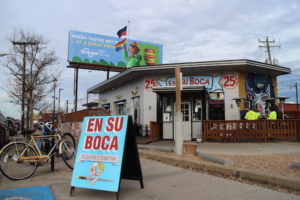
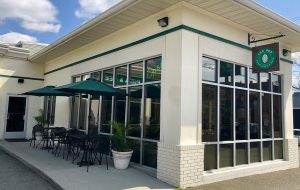
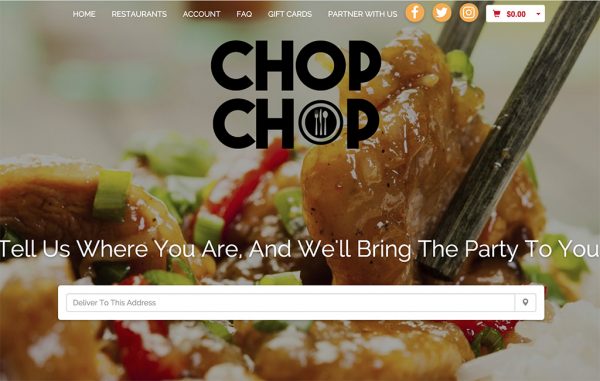



Anyone know what percentage the Toast takeout app takes off the top? There are some restaurants in my local neighborhood that offer Toast and I don’t mind going to fetch the food from myself. But honestly I do not like making phone orders. 8 times out of 10 you’ll call and get someone distracted by noise levels or multi-tasking which just makes a transaction that is always smooth over an app become mildly frustrating when instead making over a phone call…
Since Toast started as a Point-of-Sale system (used in many RVA establishments) it looks like the restaurant just pays a monthly subscription for the app itself.
https://pos.toasttab.com/pricing-toast
Venture Cap funded delivery apps are a plague of deception. If they’re not trying to build numbers for an ipo, then someone (drivers + restaurants) are getting burned. At least the restaurant owners understand math well enough to make the decision. The drivers usually don’t…..But there’s always this:
https://www.bbc.com/news/technology-52724062
I’ve noticed the sneaky pricing on the 3rd party apps like DoorDash and GrubHub. In addition to the delivery fee, the menu prices are also inflated. Knowing that the restaurants are also paying a heavy commission, I now go direct to the restaurant wherever possible.
Here is something the third party apps do, that I do not see how it is legal. Lets say you are a restaurant that has decided ##not t##o use Grub Hub. Grub Hub will create a phone number, then have that number posted under the name of the restaurant online via Yelp listing or by SEO hacking on google. So you go, look up the restaurant by name, and call a number you think belongs to the restaurant. They take your order. Then they call that restaurant, place the order, and charge you the 30% fees. I know for a… Read more »
Wow, Ed that is crazy. Thank you for sharing that tidbit of information.
They can usually figure it out, but they don’t have a contract with Grub Hub, GH is just posting a number. ZZQ and several other places found out about it by having customers reach out and complain about poor service with deliverery, when ZZQ does not deliver. I mean if you sign up for Grub Hub and feel its not worthwhile, thats one thing. But for a company to jsut insert itself as a middle man, and use SEO trickery to hide the actual number of a place and promote their number, that’s just crazy. ZZQ had this happen and… Read more »
One good thing to come out of all this is a number of restaurants have started to provide much better online ordering/curbside pickup options directly through their websites. We recently ordered from Savory Grain and Deep Run Roadhouse near VCU just to name two, and both were very convenient. If they provide curbside handoff, even better. I much prefer this over grubhub, dash, etc.